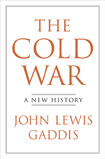 republished by the Princeton
University Press. He writes:
republished by the Princeton
University Press. He writes:I suppose this book is particularly
relevant in the present day when "news" and "truth" and "objectivity"
are terms that have a
particularly slippery consonance, even for those of us who continue to
live in the "reality-based community." From what I gather, Frankfurt
seems to
suggest that (a) those who are bullshitting and (b) those who (think
they)
aren't, are operating on similar assumptions about the nature of truth.
And that bullshit is defined not so much by the output of your bullshit
but by the processing that allows you to produce bullshit. And finally,
that
bullshit comes from a distinct lack of indifference about the truth
rather than any deliberate process of lying. There is an interesting
review of the book here
where the reviewer summarizes the difference between a lie and bullshit.
 Where before Gaddis focused on geopolitics
and power balances without explicitly looking to affix blame on one
side or the other, the new work was his first major work representing a
triumphalist strand of thinking. What,
according to Gaddis, did we know now? We knew now that the Cold War was
inevitable, and that blame for it lay squrely with the other side,
i.e., Stalin's personality, totalitarian dictatorship,
and Communism. The United States was mostly reacting to Stalin, and
that America's empire of democracy and capitalism was at best a
reluctant empire, one without a grand design. The Cold War, according
to Gaddis was ultimately a battle between good and evil
and that good prevailed. Gaddis extends this line of thinking in his
new book, touted as the synthesis of his post-Cold War thinking, the
final word so to speak, entitled The
Cold War: A New History. From what I can tell, it has been
getting a lot effusive reviews ("outstanding!"). Unlike his Cold
War-era
works, this is a terrible book, and does a deep disservice not only to
his own legacy but also to the popular conception of the Cold War. As
happens in many cases where historians
attain a certain kind of popular fame beyond academia, Gaddis' writing
has become more and more disconnected from the amazing array of
ground-breaking academic
research on Cold War in the past 15 years. Gaddis' new work suffers
from many problems, and I could go on and on, but I will list only a
few them
briefly. His claim that this is a history of the Cold War is sorely
lacking since his primary focus is on the United States, less so on the
Soviet Union, and criminally little on anywhere else, i.e., the rest of
the world where most of the actual wars of the Cold War
were played out.
Where before Gaddis focused on geopolitics
and power balances without explicitly looking to affix blame on one
side or the other, the new work was his first major work representing a
triumphalist strand of thinking. What,
according to Gaddis, did we know now? We knew now that the Cold War was
inevitable, and that blame for it lay squrely with the other side,
i.e., Stalin's personality, totalitarian dictatorship,
and Communism. The United States was mostly reacting to Stalin, and
that America's empire of democracy and capitalism was at best a
reluctant empire, one without a grand design. The Cold War, according
to Gaddis was ultimately a battle between good and evil
and that good prevailed. Gaddis extends this line of thinking in his
new book, touted as the synthesis of his post-Cold War thinking, the
final word so to speak, entitled The
Cold War: A New History. From what I can tell, it has been
getting a lot effusive reviews ("outstanding!"). Unlike his Cold
War-era
works, this is a terrible book, and does a deep disservice not only to
his own legacy but also to the popular conception of the Cold War. As
happens in many cases where historians
attain a certain kind of popular fame beyond academia, Gaddis' writing
has become more and more disconnected from the amazing array of
ground-breaking academic
research on Cold War in the past 15 years. Gaddis' new work suffers
from many problems, and I could go on and on, but I will list only a
few them
briefly. His claim that this is a history of the Cold War is sorely
lacking since his primary focus is on the United States, less so on the
Soviet Union, and criminally little on anywhere else, i.e., the rest of
the world where most of the actual wars of the Cold War
were played out.  He rightly illuminates the costs of
Communist rule in Eastern Europe during the Cold War, but belittles any
notion that American support for many client states also had deep human
costs. Like an old school diplomatic historian, he completely ignores
the incredible amount of recent scholarship on the social, cultural,
and intellectual dimensions of the Cold War. Finally, his supposed use of post-Cold War
archival information is so superficial as to raise doubt that he did
any work for this book at all. His use of Russian archival revelations
is superficial as is his use of the many declassified intelligence
documents now available at the George Washington University's National
Security Archive. There is a superb review of the new book in a recent
issue of the New York Review of Books
by Tony Judt
entitled "A Story
Still To Be
Told." For those that are considering assigning Gaddis' book in any
class, I urge you to read Judt's review first. Judt, of course, is the
author of Postwar: A History of Europe Since 1945,
recently published, and one of the greatest historians of Europe. I
have only read parts of it, and it is definitely worth a read for
anyone interested in the Cold War. [Speaking of "revisionist" history,
and the way in which "revisionism" has acquired a distinctly pejorative
sheen in
recent years, there is an interesting essay at the History News
Network by Staughton Lynd and Carl Mirra entitled "I Am A Revisionist
Historian." This is basically a polemic against President Bush's
disparaging comments about supposed revisionism about the origins of
the current war. Near the end of the essay, they write about Gaddis'
new book, locating it, in some sense, as part of a tradition of
anti-revisionism.]
He rightly illuminates the costs of
Communist rule in Eastern Europe during the Cold War, but belittles any
notion that American support for many client states also had deep human
costs. Like an old school diplomatic historian, he completely ignores
the incredible amount of recent scholarship on the social, cultural,
and intellectual dimensions of the Cold War. Finally, his supposed use of post-Cold War
archival information is so superficial as to raise doubt that he did
any work for this book at all. His use of Russian archival revelations
is superficial as is his use of the many declassified intelligence
documents now available at the George Washington University's National
Security Archive. There is a superb review of the new book in a recent
issue of the New York Review of Books
by Tony Judt
entitled "A Story
Still To Be
Told." For those that are considering assigning Gaddis' book in any
class, I urge you to read Judt's review first. Judt, of course, is the
author of Postwar: A History of Europe Since 1945,
recently published, and one of the greatest historians of Europe. I
have only read parts of it, and it is definitely worth a read for
anyone interested in the Cold War. [Speaking of "revisionist" history,
and the way in which "revisionism" has acquired a distinctly pejorative
sheen in
recent years, there is an interesting essay at the History News
Network by Staughton Lynd and Carl Mirra entitled "I Am A Revisionist
Historian." This is basically a polemic against President Bush's
disparaging comments about supposed revisionism about the origins of
the current war. Near the end of the essay, they write about Gaddis'
new book, locating it, in some sense, as part of a tradition of
anti-revisionism.] They were often about women negotiating
the fine line between degradation and apathy, but steeped in a kind of
unsympathetic loneliness that I somehow related to. Later I read a
fully fleshed out vision, the novel Two
Girls, Fat and Thin, a bizzarely gripping novel about two
completely different women who somehow connected on the most unexpected
level. The subsequent collection of short stories Because They Wanted
To (1998)
seemed to be a work biding time, closer in spirit to Bad Behavior, as if Gaitskill had
found her niche and was unwilling or unable to move beyond her thematic
and stylistic choices, approaches that create words out of the chasms
between 'loneliness' and 'alone.' I should add that most reviewers feel
compelled to mention that her stories touch on themes of emotionally
vacant sex (and sexual dysfunction). They are often shocking but not
because of the subject matter but rather for the unusual way in which
she seems to suggest that sex is often nothing more than a kind of
loneliness. As far as Gaitskill herself, from what little I read about
her, I gathered
that she was not terribly well off, living a barely middle class life.
She had an interesting well of experiences to tap: having run away from
home at the age of 15, she worked as a street vendor, an office
secretary, and a stripper. There were few prizes or accolades.
So...now, we
have her
new work Veronica: A Novel,
feted and praised all across the board in the best literary magazines. Veronica has made the final lists
on
just about every major literary award in the English-speaking world.
How did this change in her fortune occur? I have no idea. Some people
get "hip" for no reason at all. I have not read Veronica so I couldn't tell you
anything beyond the fact that it is a book, like her first novel, about
two women from extremely different circumstances. One is a washed up
supermodel (Alison) and another is a deceased woman (Veronica)
remembered by the former model; during the brief period when they knew
each other, Alison barely gave much thought to Veronica beyond the
patronizing kind, even when she was dying of AIDS. Here
is a review from the Village Voice.
They were often about women negotiating
the fine line between degradation and apathy, but steeped in a kind of
unsympathetic loneliness that I somehow related to. Later I read a
fully fleshed out vision, the novel Two
Girls, Fat and Thin, a bizzarely gripping novel about two
completely different women who somehow connected on the most unexpected
level. The subsequent collection of short stories Because They Wanted
To (1998)
seemed to be a work biding time, closer in spirit to Bad Behavior, as if Gaitskill had
found her niche and was unwilling or unable to move beyond her thematic
and stylistic choices, approaches that create words out of the chasms
between 'loneliness' and 'alone.' I should add that most reviewers feel
compelled to mention that her stories touch on themes of emotionally
vacant sex (and sexual dysfunction). They are often shocking but not
because of the subject matter but rather for the unusual way in which
she seems to suggest that sex is often nothing more than a kind of
loneliness. As far as Gaitskill herself, from what little I read about
her, I gathered
that she was not terribly well off, living a barely middle class life.
She had an interesting well of experiences to tap: having run away from
home at the age of 15, she worked as a street vendor, an office
secretary, and a stripper. There were few prizes or accolades.
So...now, we
have her
new work Veronica: A Novel,
feted and praised all across the board in the best literary magazines. Veronica has made the final lists
on
just about every major literary award in the English-speaking world.
How did this change in her fortune occur? I have no idea. Some people
get "hip" for no reason at all. I have not read Veronica so I couldn't tell you
anything beyond the fact that it is a book, like her first novel, about
two women from extremely different circumstances. One is a washed up
supermodel (Alison) and another is a deceased woman (Veronica)
remembered by the former model; during the brief period when they knew
each other, Alison barely gave much thought to Veronica beyond the
patronizing kind, even when she was dying of AIDS. Here
is a review from the Village Voice. Basically, they invite the best scholars
in the field to weigh in on such seemingly garguantian topics as
"Music" or "Ethics" or "Locke" or "Fascism" and provide a
reasonable
entrypoint into an impenetrable world of ideas, but without the jargon
and academic one-upmanship. Don't
be turned off by the concept of short books on such not-easily-defined
topics. To call these dumbed
down cliff notes for people who can't understand the real thing would
be to do them a disservice. Even if you think you know everything about a topic, say
"Foucault," you will still find unexpected insights here. I recently
ordered several books, including "Empire," "Nationalism," "The Cold War," "Postcolonialism,"
and "Poststructuralism,"
and I am thoroughly enjoying reading the books. Not only are they good
for assigning to students, but they're genuinely thought-provoking; I
find that integrating disparate strands of thinking from a million
different books, articles, and lectures into one place is not only an
act of synthesis (or summary) but also an exercise in rethinking and
reframing. For me, they are useful for revisiting these fundamental
ideas in fresh ways. Some more sample titles: "Habermas," "Anarchism," "Hieroglyphs," "Molecules," "Myth" "Indian Philosophy,"
"The Koran," "History," and "Feminism."
Basically, they invite the best scholars
in the field to weigh in on such seemingly garguantian topics as
"Music" or "Ethics" or "Locke" or "Fascism" and provide a
reasonable
entrypoint into an impenetrable world of ideas, but without the jargon
and academic one-upmanship. Don't
be turned off by the concept of short books on such not-easily-defined
topics. To call these dumbed
down cliff notes for people who can't understand the real thing would
be to do them a disservice. Even if you think you know everything about a topic, say
"Foucault," you will still find unexpected insights here. I recently
ordered several books, including "Empire," "Nationalism," "The Cold War," "Postcolonialism,"
and "Poststructuralism,"
and I am thoroughly enjoying reading the books. Not only are they good
for assigning to students, but they're genuinely thought-provoking; I
find that integrating disparate strands of thinking from a million
different books, articles, and lectures into one place is not only an
act of synthesis (or summary) but also an exercise in rethinking and
reframing. For me, they are useful for revisiting these fundamental
ideas in fresh ways. Some more sample titles: "Habermas," "Anarchism," "Hieroglyphs," "Molecules," "Myth" "Indian Philosophy,"
"The Koran," "History," and "Feminism."